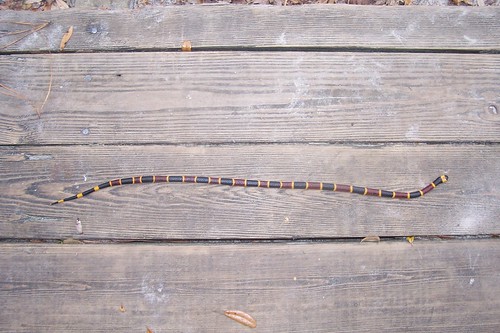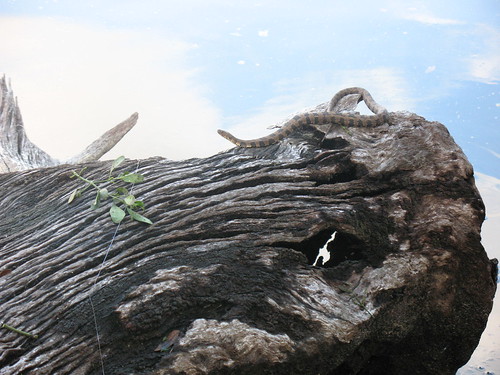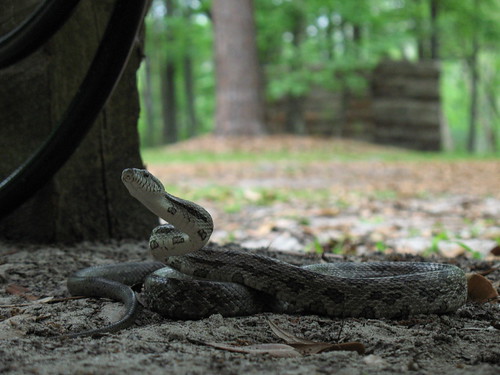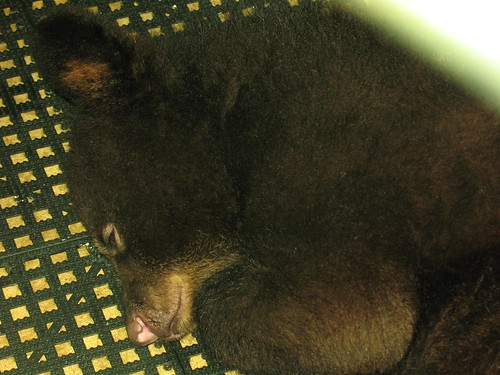The question was whether being further south in the state at my new park would mean that I would see more snakes than I do at Troy and if there would be more venomous snakes. I noticed this weekend as I went south to St. Petersburg, that there were differences in vegetation that were very obvious to me. Plants that are about to bloom here have been in bloom down south. There were even some flowers that bloomed here in the summer but died out this winter, and they were still blooming there. I am looking forward to exploring the new park to see how different things are a few hours south. I predict that I may see more snakes, but only because the slightly warmer temperature will allow them to be active longer. I think the same types of snakes will be there. We have only 6 venomous snakes in Florida and more than 40 other non-venomous snakes. They are the three types of Rattlesnakes, Copperheads, Cottonmouths, and Coral Snakes.

The Coral Snakes, I see relatively often at Troy. Like many snakes, they are timid and I have never seen one come towards me. I don't consider them much of a threat to worry about. The Rattlesnakes are also usually not aggressive and will try to get away from you before biting. They are something that I think about when walking through the woods though. Copperheads are not in the area of Troy and I don't think that they will be at Wekiwa, but I don't know for sure. They like dry, rocky areas. Cottonmouths are more bold than most snakes. They prefer warmer, marshy water over cold, clear spring water though. I have seen Cottonmouths here in Florida, but never at Troy. There are some areas of Wekiwa that would have Cottonmouths, I imagine. They are not a worry near the swimming area. There are a few Cottonmouth look-alikes that do come near the swimming areas, but they are non-venomous. The Brown Watersnakes and Banded Watersnakes are often mistaken for Cottonmouths and cause some real panic. The snake below is one of these look-alikes sunning on a log on the bank of the Suwannee River.

I enjoy snakes and respect them enough to be aware and keep a safe distance. They help control an awful lot of the rodents that we would like to have do away with. I will be sure to keep you posted on the snakes that I find at Wekiwa. Here is one more photo of a VERY common snake at Troy, an Oak Snake. Its also known as a Grey Rat Snake. It is harmless, but it does sometimes try to convince you that its dangerous by coiling up as though it is about to strike and tapping its tail rapidly like a rattler.

The other question was about Black Bears. I don't know much about them, but I hope to learn more when I get to Wekiwa Springs as bears have been seen in that park. I have only one photo of a Black Bear that I have seen in person. It was not in the wild though. I was visiting Homosassa Springs and was given the opportunity to see a baby bear that had been turned in. It was going to be transferred elsewhere for rehabilitation, but I was lucky enough to see it.

The bear question was whether Florida Black Bears hibernate in the warmer climate as their northern relatives do in the winter time. I didn't know the answer, and found out a lot of good information from the Florida Fish and Wildlife Conservation Commission's web page. The Florida Black Bears do not hibernate. They go through winter lethargy where they do slow down but its because of fewer opportunities for food and not because of the cold. I think I may be part bear, I slow down in the winter too. Another fact I learned was that babies are born in January of February. The female bear will stay primarily in her den when she has cubs so it may seem like the hibernation behavior of northern bears.
2 comments:
Born in February, eh...I know someone born in February!
I think I might be related to the bear too. But then, maybe not since I tend to be a bit lethargic more and more of the year as I do the age progression thing. LOL
Post a Comment